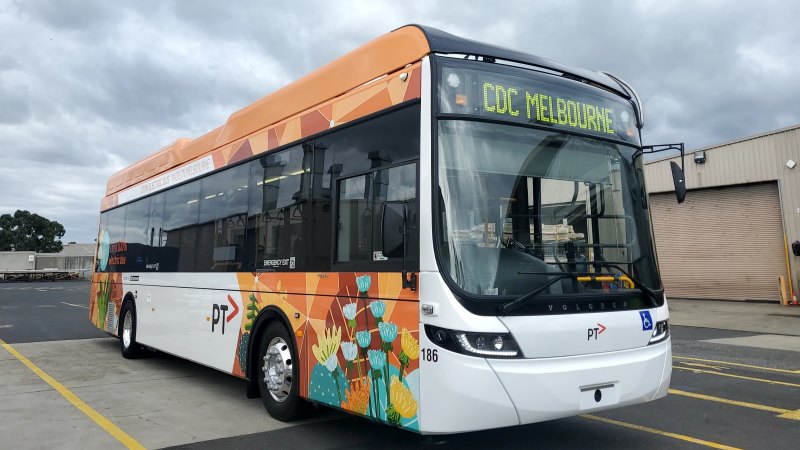Save articles for later
Add articles to your saved list and come back to them any time.
Bus drivers who say they’re working in dangerous and increasingly violent conditions are using electrification of the state’s public bus network to push for major workplace reforms.
As part of the negotiations, the Andrews government has agreed to the union’s request to set up a new committee to discuss improving safety on public transport.
The first of eight electric buses to be rolled out as part of the Victorian government’s zero emission bus trial from November.
The Victorian government is tendering for seven new bus contracts in Melbourne, which will be responsible for a fleet of up to 625 buses and cover as much as 30 per cent of the network.
Each contract will begin from July 1, 2025, and the successful companies will be expected by the end of the 10-year term to have converted their entire operations to zero-emissions buses.
The Transport Workers Union is using the process to demand these contracts include “uncompromising” safety measures that would force bus companies to follow stricter conditions for drivers.
Fatigue, long working hours and stress have all been identified as key areas of concern.
A survey of members found 53 per cent of respondents worked beyond full-time hours while 87 per cent said they had been concerned about their safety on duty.
Union leaders in the bus industry on Tuesday agreed to a campaign calling on companies to commit to new conditions for rostering and training to handle safety hazards.
Union state secretary Mike McNess said bus drivers navigated through Victorian streets every day and their welfare should be prioritised.
“We urge operators to heed our call for direct involvement and work collaboratively to address the glaring issues of fatigue, stress, and safety,” he said.
Bus drivers strike in Bundoora in 2022. Credit: Wayne Taylor
“We must foster an environment that ensures the well-being of bus drivers and the passengers they serve.”
The Transport Workers Union has also partnered with the Rail, Tram and Bus Union to sound the alarm over an increase in violence and intimidation on the network.
Crime Statistics Agency figures show that in the year to March 2023 there were 2574 crimes against the person recorded on public transport, compared to 1998 over the same period in 2022.
According to the same figures from 2019, when public transport patronage was at pre-pandemic levels, 2332 crimes against the person were recorded.
Unions say intimidation and violence are major issues on the public transport network.Credit: Darrian Traynor
Both unions asked for a “safe public transport” committee to discuss worker and passenger risks across the network and The Age can reveal the government has agreed to the request.
It will meet with operators, government agencies and unions to create a unified approach to the issue.
Public Transport Minister Ben Carroll said the government would work with operators and unions to make the system safer.
“We have taken action to deliver a safer network, including rolling out driver screens, pre-payment and other safety features such as CCTV and duress alarms,” he said.
Public Transport Minister Ben Carroll has agreed to set up a new safety committee.Credit: Luis Enrique Ascui
The new bus contracts will include minimum requirements for workplace safety, including driver fatigue, and all new buses must have driver safety screens and CCTV.
Bus tickets have also been moved to pre-pay, which means passengers no longer top up Myki cards with their driver, after ticketing was identified as the biggest cause of assaults.
Public Transport Users Association spokesman Daniel Bowen said the bus network needed reform and welcomed a “shake-up” of contracts and revised routes.
“How successful it will be is dependent on how well the government funds extra services,” he said.
“We’ve got so many bus routes that run very infrequently, or in some cases not at all, at night.
“It would be good to see the government put more attention on the bus network in terms of funding and support.”
Bowen said the public transport network was safe, but there were times when incidents happened and rapid assistance was needed.
“Bus drivers need to know that if they need police assistance they can quickly get on the radio to someone.”
Bowen said a key part of the discussions for the electric bus contracts could include having additional space in depots for chargers, improved electric upgrades and avoiding situations where buses were housed far away from their routes.
Get the day’s breaking news, entertainment ideas and a long read to enjoy. Sign up to receive our Evening Edition newsletter here.
Most Viewed in National
From our partners
Source: Read Full Article




